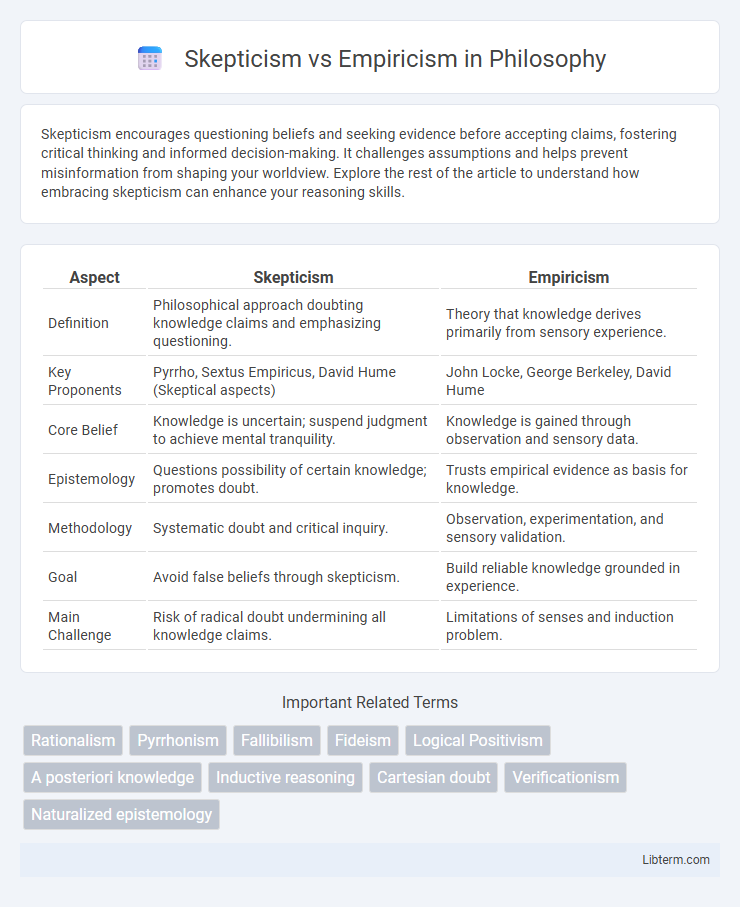Skepticism encourages questioning beliefs and seeking evidence before accepting claims, fostering critical thinking and informed decision-making. It challenges assumptions and helps prevent misinformation from shaping your worldview. Explore the rest of the article to understand how embracing skepticism can enhance your reasoning skills.
Table of Comparison
| Aspect | Skepticism | Empiricism |
|---|---|---|
| Definition | Philosophical approach doubting knowledge claims and emphasizing questioning. | Theory that knowledge derives primarily from sensory experience. |
| Key Proponents | Pyrrho, Sextus Empiricus, David Hume (Skeptical aspects) | John Locke, George Berkeley, David Hume |
| Core Belief | Knowledge is uncertain; suspend judgment to achieve mental tranquility. | Knowledge is gained through observation and sensory data. |
| Epistemology | Questions possibility of certain knowledge; promotes doubt. | Trusts empirical evidence as basis for knowledge. |
| Methodology | Systematic doubt and critical inquiry. | Observation, experimentation, and sensory validation. |
| Goal | Avoid false beliefs through skepticism. | Build reliable knowledge grounded in experience. |
| Main Challenge | Risk of radical doubt undermining all knowledge claims. | Limitations of senses and induction problem. |
Introduction to Skepticism and Empiricism
Skepticism challenges the certainty of knowledge by questioning the validity of beliefs and demanding rigorous proof before acceptance. Empiricism asserts that knowledge arises primarily from sensory experience and observation, emphasizing evidence gathered through the five senses. Both philosophical approaches critically influence scientific inquiry and epistemology by addressing how humans acquire and validate knowledge.
Historical Origins and Key Philosophers
Skepticism traces its origins to ancient Greek philosophers like Pyrrho and Sextus Empiricus, who questioned the possibility of certain knowledge and emphasized suspending judgment. Empiricism emerged prominently in the early modern period with John Locke, George Berkeley, and David Hume, advocating that knowledge derives primarily from sensory experience. The historical dialogue between these schools shaped epistemology, contrasting doubt-driven inquiry with evidence-based understanding.
Core Principles of Skepticism
Skepticism is grounded in the core principle of questioning the certainty of knowledge claims and emphasizing doubt as a tool for inquiry. It challenges the possibility of absolute truth by demanding rigorous evidence before accepting beliefs. This philosophical approach contrasts with empiricism, which prioritizes sensory experience and observation as the primary sources of knowledge.
Fundamental Tenets of Empiricism
Empiricism emphasizes knowledge acquisition through sensory experience and observation, asserting that all ideas originate from perceptual input rather than innate concepts. Fundamental tenets include the belief that the mind begins as a blank slate (tabula rasa), and that empirical evidence is essential for validating knowledge claims. This approach contrasts with skepticism by affirming that reliable knowledge is attainable through systematic experimentation and sensory data.
Comparing Epistemological Approaches
Skepticism questions the possibility of certain knowledge, emphasizing doubt and critical inquiry towards claims lacking sufficient evidence. Empiricism prioritizes sensory experience and observational data as the primary sources of knowledge, asserting that understanding arises through tangible evidence. Both epistemological approaches address the nature and limits of knowledge but diverge in their stance on the certainty and origins of justified belief.
Major Debates in Skepticism vs Empiricism
Major debates in skepticism versus empiricism revolve around the reliability of sensory experience as a source of knowledge, with skeptics questioning whether sensory data can provide certain or infallible understanding, while empiricists defend observation and experimentation as foundational methods for acquiring knowledge. Key discussions include the problem of induction, where skeptics argue that past sensory experiences cannot guarantee future occurrences, contrasting with empiricist claims that inductive reasoning remains the best practical tool for scientific discovery. The tension also extends to the challenge of external world skepticism, where empiricists rely on empirical evidence to affirm reality's existence, whereas skeptics demand more rigorous justification beyond sensory input.
Impact on Scientific Methodology
Skepticism challenges the certainty of knowledge by emphasizing doubt and questioning the validity of assumptions, which sharpens critical analysis in scientific methodology. Empiricism relies on sensory experience and observable evidence as the foundation for knowledge, driving experiments and data collection in scientific research. Combining skepticism with empiricism enhances the scientific method by promoting rigorous testing, reproducibility, and continuous revision of hypotheses based on empirical data.
Criticisms of Skepticism
Criticisms of skepticism emphasize its tendency to lead to intellectual paralysis by doubting all knowledge claims, which renders practical decision-making impossible. Empiricism challenges skepticism by asserting that knowledge is grounded in sensory experience and observable evidence, making certainty attainable through scientific methods. Critics argue skepticism undermines the reliability of empirical data, but empiricism demonstrates that knowledge accumulation and verification are achievable despite inherent uncertainties.
Critiques of Empiricism
Critiques of empiricism highlight its reliance on sensory experience, which can be subjective and prone to error, limiting the certainty of knowledge derived solely from observation. Skepticism challenges empiricism by questioning the reliability of sensory data and emphasizing the need for greater justification beyond mere empirical evidence. Philosophers like David Hume argue that inductive reasoning, fundamental to empiricism, lacks rational foundation, exposing the potential weaknesses in empirical claims.
Modern Relevance and Applications
Skepticism and empiricism shape modern scientific inquiry by emphasizing doubt and evidence-based validation, respectively. In fields like medicine and technology, skepticism drives rigorous hypothesis testing, while empiricism ensures conclusions rely on observable data and experimentation. This dynamic interplay enhances critical thinking, innovation, and informed decision-making in contemporary knowledge-driven societies.
Skepticism Infographic

 libterm.com
libterm.com